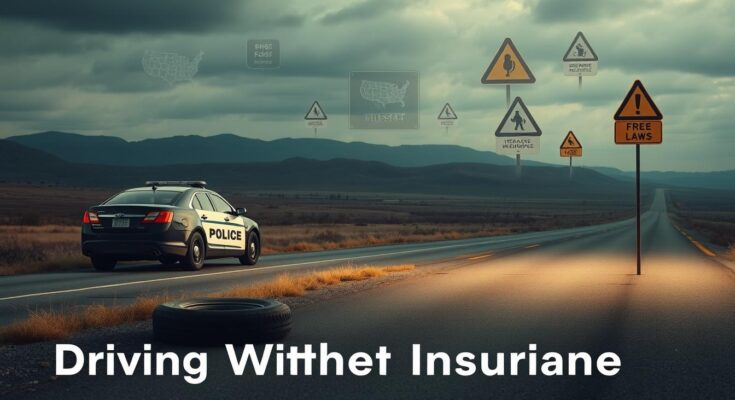In the United States, driving without insurance is a big deal. It can lead to serious penalties. But what happens if you’re caught driving without insurance? This article explores the penalties, fines, and legal issues in each state.
Most U.S. states require car owners to have insurance. Not having it can result in fines, license suspensions, or even criminal charges. But the penalties vary by state. So, what are the penalties for driving without insurance where you live?
Key Takeaways
- Driving without insurance is illegal in most U.S. states and can result in severe penalties.
- Fines for uninsured driving can range from a few hundred dollars to thousands, depending on the state.
- Repeated offenses or driving without insurance after an accident may lead to license suspension, vehicle impoundment, or even criminal charges.
- The long-term financial consequences of being caught uninsured can be significant, including increased insurance premiums and legal fees.
- Certain exceptions and alternative coverage options may be available in some states for low-income drivers or those facing hardship.
Understanding Mandatory Auto Insurance Laws in the US
In the United States, vehicle insurance is a must. All states have laws that make it a legal duty for car owners to have insurance. This rule helps ensure drivers can pay for damages or injuries they might cause.
Minimum Coverage Requirements by State
Each state has its own rules for how much insurance you need. Usually, drivers must have liability insurance. This policy helps pay for damages or injuries to others if you’re at fault in an accident. The amount you need can vary a lot, from $10,000 to $25,000 or more.
Legal Obligations for Vehicle Owners
- Maintain active auto insurance coverage at all times while operating a vehicle
- Provide proof of insurance when requested by law enforcement or during vehicle registration
- Update insurance policies when making changes to the vehicle or driver information
Exceptions to Mandatory Insurance Laws
Not all states require insurance. Some allow owners to show they can pay for accidents in other ways. Also, some low-income people might get help with insurance through state programs.
“Driving without insurance is not only illegal, but it also puts you and others at financial risk. It’s important to understand your state’s mandatory insurance laws and ensure you have the necessary coverage in place.”
Penalty for Driving Without Insurance: State-by-State Guide
In the United States, driving without insurance has different penalties in each state. Knowing what happens in your area is key. The fines, legal issues, and actions by the state can hurt your wallet and driving rights.
Some states hit you hard if you’re caught without insurance. For example, in California, a first-time offense can cost up to $1,000. New York’s fine can go up to $1,500. These high fines aim to keep drivers from risking it without insurance.
Driving without insurance can lead to more than just fines. You might lose your license, have your car registration taken away, or even face jail time. In Florida, a first offense can suspend your license for three years. Texas might charge you with a misdemeanor and jail you for up to a year.
| State | Fines for Driving Without Insurance | Other Penalties |
|---|---|---|
| California | Up to $1,000 for first offense | Vehicle registration suspension, driver’s license suspension |
| New York | Up to $1,500 for first offense | Vehicle impoundment, points on driving record |
| Florida | $500-$1,000 for first offense | Driver’s license suspension for up to 3 years |
| Texas | $175-$350 for first offense | Misdemeanor charge, up to 1 year in county jail |
It’s crucial to know the laws and penalties in your state. Driving without insurance can seriously affect your finances and legal status. By understanding the risks, drivers can choose to stay insured and avoid these problems.
Financial Consequences of Driving Uninsured
Driving without auto insurance can lead to big financial problems. You might face fines, higher insurance costs, and more. These issues can quickly drain your wallet.
Monetary Fines and Penalties
The first hit is the fine from the state. These fines can be hundreds or even thousands of dollars. They aim to stop people from driving without insurance.
Long-term Financial Impact
Driving uninsured can cause more than just a fine. If you’re in an accident without insurance, you could be responsible for damages. This can lead to expensive legal fights and settlements. Such costs can pile up and hurt your finances for years.
Insurance Premium Increases
Getting caught driving without insurance also means higher insurance rates later. Insurers see uninsured drivers as riskier. They might charge you more for coverage, even if you get insured. This makes finding affordable insurance hard.
“The financial consequences of driving uninsured can be devastating, potentially leading to crippling debt and long-term financial instability. It’s simply not worth the risk.”
License Suspension and Vehicle Registration Consequences
Driving without insurance can lead to serious penalties. These include losing your driver’s license and having your vehicle registration revoked. The severity of these penalties varies by state but highlights the need for valid auto insurance.
In many places, driving without insurance means your license is suspended right away. The length of this suspension can be from a few months to several years. It depends on the laws and your driving history. You won’t be allowed to drive during this time, and driving with a suspended license can lead to more fines and even criminal charges.
- License suspension typically lasts from 3 months to 1 year for a first-time offense
- Repeat offenses or failure to reinstate your license can lead to longer suspensions, often 1-2 years
- In some states, your vehicle registration may also be revoked, preventing you from legally driving your car
The effects of driving uninsured can last a long time. Getting your driving rights back might require paying fines, showing proof of insurance, and installing an ignition interlock device. It’s important to know and follow your state’s auto insurance laws to avoid these harsh penalties.
“The cost of driving without insurance is simply not worth the risk. It’s essential to protect yourself and others by maintaining the required coverage.”
Criminal Penalties and Legal Ramifications
Driving without insurance can lead to serious legal issues. States may charge drivers with misdemeanors or felonies. These charges can include fines, jail time, and a criminal record. It’s important for drivers to know the legal risks of not having insurance.
Misdemeanor vs. Felony Charges
The severity of charges for driving without insurance varies. A first-time offense is often a misdemeanor. This can mean fines from $500 to $1,000 and up to a year in jail.
However, if there are aggravating factors, like causing an accident, the charges can be felonies. Felonies can result in much higher fines and several years in prison.
Court Appearances and Legal Proceedings
- Drivers charged with driving without insurance must appear in court. They may need to go through multiple hearings and proceedings.
- These court appearances can include arraignments, pretrial conferences, and possibly a trial. This depends on the charges and the defendant’s plea.
- A conviction can also lead to a suspended driver’s license and vehicle registration. This makes the legal process even more complicated.
Dealing with the legal system for driving without insurance can be overwhelming. It’s wise to seek help from an experienced attorney. They can help ensure the best outcome and protect the driver’s record and finances.
SR-22 Insurance Requirements and Compliance
If you’re caught driving without vehicle insurance in the United States, you might need an SR-22 insurance certificate. This form is for drivers who lost their legal driving rights due to lack of insurance or other violations.
The SR-22 is not a policy but a document proving you have the needed no auto insurance penalties coverage. You’ll need it for 3 to 5 years, depending on your state. If you don’t keep it, you could face penalties like license suspension or extra fees.
Obtaining an SR-22 Certificate
To get an SR-22, talk to your insurance provider. Here’s what you need to do:
- Buy a policy that meets your state’s vehicle insurance requirements
- Ask your insurance company to file the SR-22 form with the state
- Pay any extra fees or charges for the SR-22 filing
Not all insurance companies offer SR-22 policies. You might need to look around to find one that does.
Maintaining SR-22 Compliance
After getting the SR-22, keep your coverage going without breaks. If your policy ends or is canceled, your insurance company must tell the state. This can lead to more penalties and possibly losing your driver’s license.
Dealing with mandatory insurance laws and SR-22 rules can be tricky. But knowing the steps and your duties can help you avoid fines and legal trouble. Stay informed and follow the right steps to get your driving rights back safely and legally.
Impact on Your Driving Record and Insurance History
Driving without insurance can hurt your driving record and future insurance chances. It’s key for drivers to understand this impact.
Points System and Record Duration
Getting caught without insurance means points on your record. The points range from 2-4, depending on where you live. These points stay on your record for 3-5 years.
Too many points can lead to losing your license, higher insurance costs, and even criminal charges. Keeping your record clean helps avoid these driving uninsured consequences and insurance violation penalties.
Future Insurance Implications
A history of driving without insurance can make getting affordable insurance hard. Insurers see uninsured drivers as higher risks, leading to higher premiums or even policy denials.
- Insurance companies might see you as a “high-risk” driver, raising your rates for years.
- You might need an SR-22 policy, which is pricier and has stricter rules.
- The insurance violation penalties and lack of insurance citations on your record can affect you for years, making it hard to find cheap coverage.
Having the right auto insurance is not just legal; it’s also smart for your safety and others on the road. Knowing the long-term effects of driving without insurance helps you make better choices and avoid expensive problems.
| Offense | Points Added | Record Duration |
|---|---|---|
| Driving Without Insurance | 2-4 points | 3-5 years |
| Driving With Suspended License | 6 points | 5 years |
| Reckless Driving | 4-6 points | 3-5 years |
Steps to Take If Caught Driving Without Insurance
Being pulled over without insurance can be stressful. It’s important to stay calm and follow the right steps. Here’s what to do if you’re caught:
- Cooperate with the officer. Give them your license, registration, and any other documents they ask for.
- Be honest about why you don’t have insurance. If you forgot to renew or are getting coverage, say so.
- Ask for a grace period. Some places let you get a temporary permit to drive legally while you get insurance.
- Don’t admit to anything wrong. Avoid saying anything that could hurt your case in court.
- Get proof of insurance fast. This is key to fixing the problem and avoiding big penalties.
- Call your insurance company right away. Tell them what happened and talk about getting your coverage back.
- Get ready for fines and penalties. Depending on where you are, you might face money fines, license suspension, or more.
By following these steps, you can handle being caught without insurance well. You can work to fix the problem responsibly.
| Penalty for Driving Without Insurance | Fines for Uninsured Drivers | Uninsured Motorist Fines |
|---|---|---|
| Monetary fines, ranging from $100 to $5,000 depending on the state | Typically between $500 and $1,000 for the first offense | Fines can be as high as $1,000 or more, plus potential license suspension |
Remember, the fines for driving without insurance can be very high. It’s crucial to keep your insurance up to date and fix any gaps quickly.
“The consequences of driving without insurance can be financially devastating. It’s simply not worth the risk.”
Alternative Insurance Options and Low-Cost Coverage
Drivers who can’t afford regular auto insurance have other choices. There are state-sponsored insurance programs and ways to find cheaper coverage. These options help drivers meet their insurance needs without breaking the bank.
State-Sponsored Insurance Programs
Many states have their own insurance plans. These plans offer basic coverage at a lower cost. They are for drivers who can’t get or afford regular insurance. These programs are a big help for those struggling to find auto insurance.
Finding Affordable Coverage Solutions
There are more ways to get affordable auto insurance. Drivers can compare quotes from different companies. They can also look for discounts, like for safe driving or safety features in their car. Or, they can choose higher deductibles to pay less each month. By trying these options, drivers can find insurance that fits their budget.
FAQ
What are the penalties for driving without insurance?
Penalties for driving without insurance vary by state. They usually include fines, license suspension, and sometimes jail time. The exact penalties depend on several factors like the offense’s first-time nature, the coverage amount, and state laws.
How much are the fines for driving without insurance?
Fines for driving without insurance can be from a few hundred to over $1,000. Some states add extra fees or surcharges to the base fine.
Can I lose my license for driving without insurance?
Yes, driving without insurance often leads to license suspension in most states. The suspension length varies based on if it’s a first-time offense or not.
What are the long-term financial consequences of driving without insurance?
Driving without insurance can lead to high insurance premiums later. You might also have to pay for damages or injuries yourself. Legal fees or court costs are additional financial burdens.
Can I face criminal charges for driving without insurance?
In some states, driving without insurance is a criminal offense. This can result in fines, jail time, and a criminal record, depending on the circumstances.
What is an SR-22 and how does it impact me if I’m caught driving without insurance?
An SR-22 is high-risk auto insurance required by some states after driving without insurance. It can greatly increase your insurance costs and make finding affordable coverage harder.
How long does a driving without insurance violation stay on my record?
A driving without insurance violation stays on your record for 3-5 years, varying by state. This can affect your insurance options and rates.
What should I do if I’m caught driving without insurance?
If caught driving without insurance, cooperate with law enforcement and provide proof of insurance if you have it. Obtain the required coverage immediately. You’ll also need to handle fines, license suspensions, and court appearances.
Are there any low-cost or alternative insurance options if I can’t afford regular auto insurance?
Yes, some states offer low-cost or state-sponsored insurance for those struggling to afford regular coverage. You can also look into usage-based insurance or bundling auto and home insurance to save money.




